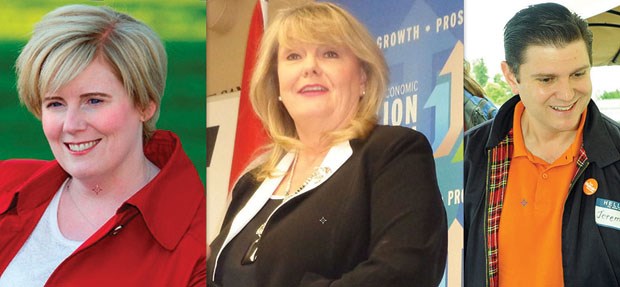It's much too early to start making any predictions about how the federal election will unfold in Delta, but it could be tough unseating the Conservatives, even if there's wave of change, according to a pair of political science professors. When Prime Minister Stephen Harper dropped the writ earlier this month, it triggered what will be one of the lengthiest election campaigns in recent memory with voters not going to the polls until Oct. 19.
When the campaign began, there were three declared candidates in Delta: Conservative incumbent Kerry-Lynne Findlay, Liberal Carla Qualtrough and Jeremy Leveque of the NDP. Anthony Devellano has since come forward to represent the Greens, while others are also expected to declare in the coming weeks.
They'll be battling it out in a newly reconfigured Delta-only riding that has South Delta coming together with North Delta for the first time in two decades.
South Delta, which had been part of a riding that included a big chunk of Richmond. has been a rightwing stronghold for many years and the Conservatives have traditionally been a safe bet in federal elections. Findlay got over 50 per cent of the vote in her first run for office four years ago to replace fellow Tory John Cummins, who retired from federal politics after 18 years.
Having a population slightly larger than Tsawwassen and Ladner combined, North Delta had been part of the Newton-North Delta riding, which was won by the NDP in the last election but has been held by the Liberals and Conservatives before that.
Interestingly, poll predictor Eric Grenier's website ThreeHundredEight.com has Leveque winning Delta in an extremely tight threeway race. The site shows Leveque taking about 33 per cent of the vote, narrowly ahead of Findlay and Qualtrough at just over 30 per cent each. The likelihood of that result is just over 56 per cent, the website states.
On his website, Grenier explains how his seat projection model for ridings is based on regional shifts in support since the 2011 election and takes into account other factors and the most recent polls.
Max Cameron, a UBC professor of political science and director of the Centre for the Study of Democratic Institutions, told the Optimist another website he came across listing close races doesn't include Delta, which isn't surprising considering how well the Conservatives have done here over the years.
"The polls that the Conservatives have, they tend to hold by a pretty wide margin. You'd need a fairly substantial shift in overall public opinion to alter that on the polls where they are dominant. There may be close ridings but I don't see how this one is," he said.
Saying it's still early days as far as B.C., Cameron said in order for the NDP to win a majority of seats there would have to be a real erosion of Conservative support. Concern about oil tankers and spills and other issues, such as the controversial Bill C-51, could give New Democrats some momentum, but that doesn't necessarily mean real Conservative strongholds will be lost, Cameron said.
In the end, there could be shift back to the Conservatives if people decide by election time they will stick with a safer choice, he added.
niversity of Victoria political scientist Kimberly Speers agreed it's too early to start making projections, saying polls in the late stages of the campaign will likely be much more accurate.
Speers said South Delta's traditional right-wing leaning could make it difficult to unseat the incumbent unless there's a significant appetite for change.
"If the Liberals, NDP and Greens split the vote, that could give the Conservatives, who at least in the past have had such a stronghold in South Delta, all they need. You also have to look at having a minister who's been handing out all kinds of money and Findlay looks like she's going to be the prime minister's righthand person representing B.C., and that always seems nice as well," she said.
As far as Delta, even if a poll is suggesting Conservative numbers are slipping, Speers, who teaches research methodology, noted it may not even be accurate, depending on the way it was delivered, what questions were asked, who answered them and even if respondents are being upfront about who they prefer.
"I take a lot of these polls with a grain of salt," she added. "It's a long campaign, a lot can happen."



